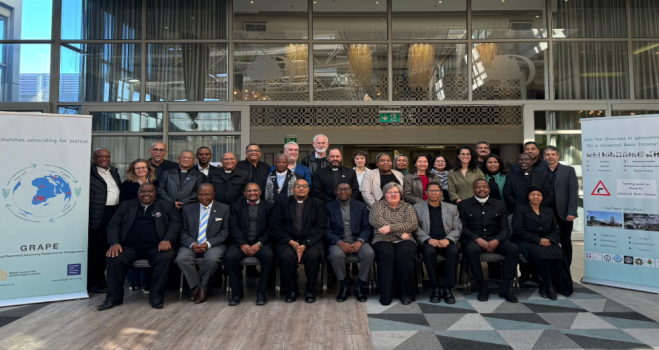“As it is widely known that South Africa is the country with the widest gap between the rich and the poor it is time that a Basic Income Grant is introduced in South Africa so that we try to narrow the gap between the poor and the rich.”
These are the words of Professor Leepo Modise at the official launch of the Global Reformed Advocacy Platforms for Engagement (GRAPE) of the World Communion of Reformed Churches (WCRC) on July 25th, 2024, in Cape Town, South Africa, making the case for the introduction of a Universal Basic Income Guarantee (UBIG) in South Africa.
At this launch of the South African GRAPE platform, the leaders of the South African member churches of the WCRC came together in Cape Town to sign a historic pledge, declaring their support for a universal basic income guarantee in South Africa and joining the existing Universal Basic Income Coalition in South Africa. The pledge signed by the WCRC member church leaders, calls for the “introduction of a Universal Basic Income as a guarantee (UBIG) to provide essential income support to individuals aged 18-59. The UBIG should initially be set at a minimum of R760 per person monthly, aligned with the Food Poverty Line, and adjusted over time as the economy grows.”
The document also lays out the compelling case for UBIG based on South Africa’s triple challenge of poverty, unemployment and inequality, and points to evidence for the impact of a UBIG in addressing these challenges.
The launch of the South African GRAPE platform was attended by church leaders of the Uniting Presbyterian Church in Southern Africa (UPCSA), the Uniting Reformed Church in Southern Africa (URCSA), the Calvin Protestant Church, the United Congregational Church of Southern Africa(UCCSA), the Volkskerk, the Presbyterian Church of Africa (PCA), the Rhenish Church South Africa, and the Dutch Reformed Church (DRC), with support from the Anglican Church of South Africa and the Archbishop, including in his capacity as President of the South African Council of Churches. The church leaders have provided and presented their theological, ethical and practical reasons for supporting UBIG in a series of moving statements:
Archbishop Thabo Makgoba, Archbishop of the Anglican Church of Southern Africa and President of the South African Council of Churches said in a prerecorded video: “A Universal Basic Income is the yardstick of the new government to achieve tangible results and to improve the lives of many millions of South Africans. A Universal Basic Income is the starting line and a prerequisite which provides a platform to kickstart equitable and sustainable development for all South Africans.”
Dr Nioma Venter, General Secretary of the Dutch Reformed Church, said:
“We need to acknowledge that this morning today, 25% of people in South Africa do not have the ability to live above the basic food line, which is ZAR760 per month. This is unthinkable, it is unbearable to think of, and it is also unacceptable.”
Father Michael Lapsley, Founder of the Institute for Healing of Memories said:
“The faith community needs to be at the forefront of supporting the Basic Income Grant which will enable every South African to have the basis of a decent human life.”
Rev Dr Lungile Mpetsheni, General Secretary of the Uniting Presbyterian Church in Southern Africa said:
“What UBIG says is in line with what the Shona people of Zimbabwe say. They say: “I slept if you slept – so all that UBIG tries to do is to bridge this gap so that we cannot sleep when others did not sleep because of hunger, because of starvation, it will mean everybody has something in their stomach when they go to sleep.”
Muna Nassar, the WCRC Executive Secretary for mission and advocacy, stresses the role of the church in advocacy by saying: “I think it is important if the church wants to be critical to its calling, to be standing to where people are suffering, not to be standing in contexts of power. Therefore, advocacy is really putting faith into action and challenging the realities of oppression”.
The vehicle to advocate for the introduction of the UBIG from the side of the churches is the GRAPE program which was established by the WCRC and started in 2022, to address the enormity and complexity of the unjust economic situation coupled with the climate crisis by establishing and growing networks of advocates in church and civil society. This has been done to give effect to the WCRC’s Accra confession of 2004. In the confession, the WCRC identified the unjust economic system as the root cause of human suffering. “Until this day, economic injustice continues to pose a direct threat to the very existence of our collective humanity” said WCRC Vice President of Africa Rev. Dr. Samuel Ayete-Nyampong.
The Global Reformed Advocacy Platform for Engagement (GRAPE) brings together stakeholders to advance key issues of justice and inclusion in South Africa and Kenya, in partnership with the Economic Policy Research Institute (EPRI).
It is funded by Brot für die Welt and Otto per Mille. As additional financial support is secured, the GRAPE project will expand both in duration and countries impacted.


